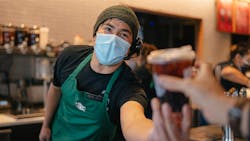Starbucks' Q1 net revenue rises 19% to $8.1 billion, comparable store sales up 13%
Starbucks Corp. (Nasdaq: SBUX) this week reported rising financial results for its 13- week fiscal first quarter, ended Jan. 2. The company reported GAAP EPS of $0.69 (and non-GAAP EPS of $0.72), which was impacted by greater-than-expected inflation and COVID-19 related pay and staffing costs.
The coffeehouse giant said its comparable store sales increased 13% on a 10% jump in comparable transactions and 3% increase in average tickets. North America and U.S. comparable store sales increased 18%, primarily driven by a 12% increase in comparable transactions and 6% increase in the average ticket. International comparable store sales decreased 3%, driven by a 5% decline in the average ticket, partially offset by a 2% increase in comparable transactions;
In China, Starbucks' comparable store sales decreased 14%, driven by a 9% decline in the average ticket and a 6% decline in transactions.
In China, the number of Starbucks stores surpassed 5,500, pushing the company's global store count to a record 34,317. Active Starbucks Rewards Membership in the U.S. was up 21% year-over-year to 26.4 million,
“Although demand was strong, this pandemic has not been linear, and the macro environment remains dynamic as we experienced higher-than-expected inflationary pressures, increased costs due to omicron and a tight labor market," said Starbucks president and chief executive Kevin Johnson.
The chief executive told CNBC that reduced international travel and low traffic to office buildings weighed on Starbucks’ same-store sales in China, CEO Kevin Johnson said Wednesday.
“Our stores that are in airports in the international travel terminals are closed, so clearly that’s weighing on comps,” Johnson said on CNBC’s Squawk on the Street.
Likewise, Johnson added, stores in office districts are much slower than they used to be, as workers continue to clock hours at home. However, stores in residential and commercial zones are seeing same-store sales growth, which he said is a positive sign for demand in the country.
